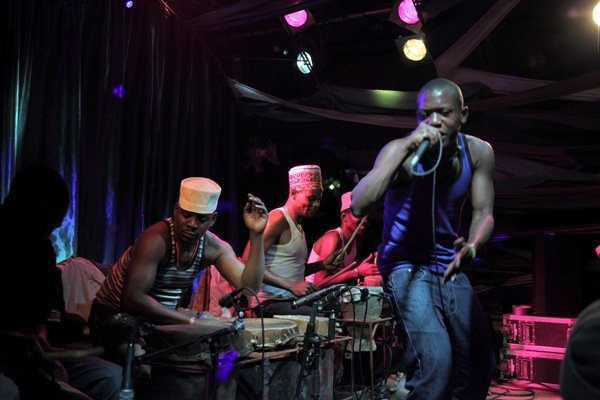


NEWS:
Almost no time left to hear November's shows streaming and vote in the 2025 Festive 50!
Artist Info
|
Jagwa Music  Image from Discogs  Jagwa Music is a Mchiriku collective from Dar-es-Salaam (Tanzania). Imagine a crew of 8 youngsters (with a great, urban dress sense) playing nutty grooves at breakneck speed on traditional percussion, a keyboard player going mad on a battered vintage Casio, and three relentless front persons: two breathtaking, spectacular dancers and a charismatic lead vocalist/MC, belting out songs about survival in the urban maze, unfaithful lovers and voodoo. Jagwa Music is a Mchiriku collective from Dar-es-Salaam (Tanzania). Imagine a crew of 8 youngsters (with a great, urban dress sense) playing nutty grooves at breakneck speed on traditional percussion, a keyboard player going mad on a battered vintage Casio, and three relentless front persons: two breathtaking, spectacular dancers and a charismatic lead vocalist/MC, belting out songs about survival in the urban maze, unfaithful lovers and voodoo. Strange as it may seem when you're looking at the current band members' youthful looks, (the line-up of musicians has gradually renewed itself over the years...) Jagwa Music was founded around twenty years ago. They are the leading exponent of the Mchiriku style of playing which developed in the poor suburbs of Dar es Salaam, when cheap Casio keyboards became available and drew the attention of bands playing Chakacha dance music. What happened next is reminiscent of other, by now familiar stories (like that of Konono Nº1): Jagwa Music & their peers were immediately attracted by the Casio's lo-fi sound, adopted it, rechristened it kinanda ("a box that plays music"), and hooked it to vintage amps & megaphones. This new gritty, edgy, distortion-laden sound became known as Mchiriku. Although it's been deliberately ignored by the Tanzanian media, as it is associated with uhuni (thuggery) & the city's low life, it has been thriving ever since. Jagwa Music have a large following around Dar es Salaam: almost everybody knows their songs, which relate to everyday issues. Many of their lines have become proverbial: you can see quotes from their songs painted as slogans to the sides or backs of the local dala dala bus taxis. The songs often contain advice on how to survive in the city, when you're faced with unemployment, oppressive relatives, unfaithful girlfriends or husbands, AIDS, drugs & alcohol. Jagwa's members are all living the street life themselves, mostly working in Dar es Salaam's cut-throat private bus-taxi business as dei-waka (unlicensed drivers who jump in when another driver is caught by police or does not make it to work). Others are manamba, who, for a few shillings in return, hustle customers into dala dala buses. By mid-day they will have made enough money to keep them going until the next morning, paying for food and other enjoyments they may like. In the afternoon they all meet at their maskani (hangout) under a tree in Mwananyamala close to their patron Jolijo's little restaurant & home. When they need to rehearse new songs, they convene in Jolijo's backyard to get it all down. Friday, they stop hustling for the week & their performing weekend usually starts. They relax all day and play all-night mchiriku gigs at family celebrations such as weddings around Dar's suburbs or smaller towns in the vicinity. The name "Jagwa" has roots in terminology that originated during the first Gulf War. In response to a rival band who had named itself in honor of the Scud missile, the group chose to fight back with an homage to a French fighter plane, the Jaguar. And as for the title of the album: "Bongo" is the nickname for Dar es Salaam. It comes from a proverbial expression in Swahili: "kuchemsha bongo", literally "to make the brain boil" (i.e. "Hothead"), meaning "to think hard", because in Dar, you need to use your brains to survive. Read more on Last.fm. User-contributed text is available under the Creative Commons By-SA License; additional terms may apply. Artist biography from last.fm Some other places to look for information: last.fm Discogs MusicBrainz |
